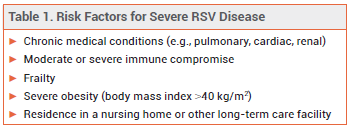RELEASE
ARTICLE
The FDA has required a new warning in the labels of the recombinant respiratory syncytial virus (RSV) vaccines Arexvy (GSK) and Abrysvo (Pfizer) about an increased risk of Guillain-Barré syndrome (GBS) within 42 days of administration of either vaccine. Both vaccines are FDA-approved to prevent lower respiratory tract disease (LRTD) caused by RSV in adults. Abrysvo is also approved for use in pregnant women at 32-36 weeks’ gestation to prevent RSV-associated LRTD in their infants from birth through 6 months of age.1,2
GBS — According to the CDC, 3000-6000 cases of GBS are reported annually in the US; the syndrome is more common in men and in those >50 years old. In many cases, GBS occurs following a viral or bacterial infection. Administration of some COVID-19 and seasonal influenza vaccines has been associated with GBS.
BASIS FOR WARNING — The new warning is based on cases of GBS reported to the Vaccine Adverse Event Reporting System (VAERS), data from clinical trials, and a postmarketing observational study of Medicare data among persons ≥65 years old that found the risk of GBS during the 42 days following vaccination, compared to the risk 43-90 days post-vaccination, was an estimated 9 additional cases per million doses with Abrysvo and 7 additional cases per million doses with Arexvy; a causal relationship has not been established for either vaccine.3,4 In the pivotal clinical trials that led to approval of Arexvy and Abrysvo, in which 12,467 patients received Arexvy and 17,215 received Abrysvo, GBS occurred in one patient 9 days after vaccination with Arexvy and one case each of GBS and Miller Fisher syndrome (a variant of GBS) occurred 7 and 8 days, respectively, after vaccination with Abrysvo.1
GBS has not been reported to date with the mRNA RSV vaccine mResvia (Moderna) and its label does not include a warning about an increased risk of GBS associated with its use.5
RECOMMENDATIONS — The CDC Advisory Committee on Immunization Practices (ACIP) recommends a single dose of an RSV vaccine (Arexvy, Abrysvo, or mResvia) for all adults ≥75 years old and for those 60-74 years old at increased risk of severe RSV disease (see Table 1).6
The CDC recommends that pregnant women at 32-36 weeks' gestation just before or during the RSV season (typically September-January) receive one dose of Abrysvo.7
The FDA state that the benefits of vaccination outweigh the potential risk of GBS.3
- Two vaccines (Arexvy and Abrysvo) for prevention of RSV disease. Med Lett Drugs Ther 2023; 65:155.
- In brief: RSV vaccine (Arexvy) for ages 50-59. Med Lett Drugs Ther 2024; 66:113.
- FDA Safety Communication: FDA requires Guillain-Barré syndrome (GBS) warning in the prescribing information for RSV vaccines Abrysvo and Arexvy. Available at: https://bit.ly/3DWARTq. Accessed January 8, 2025.
- P Lloyd. Evaluation of Guillain-Barré syndrome (GBS) following respiratory syncytial virus (RSV) vaccination among adults 65 years old and older. Meeting of the Advisory Committee on Immunization Practices (ACIP) Respiratory Syncytial Virus (RSV) vaccine, adults. October 23-24, 2024. Available at: https://bit.ly/4j9tLv1. Accessed January 8, 2025.
- A new RSV vaccine (mResvia) for adults ≥60 years old. Med Lett Drugs Ther 2024; 66:166.
- A Britton et al. Use of respiratory syncytial virus vaccines in adults aged ≥60 years: updated recommendations of the Advisory Committee on Immunization Practices – United States, 2024. MMWR Morb Mortal Wkly Rep 2024; 73:696. doi:10.15585/mmwr.mm7332e1
- KE Fleming-Dutra et al. Use of the Pfizer respiratory syncytial virus vaccine during pregnancy for the prevention of respiratory syncytial virus-associated lower respiratory tract disease in infants: recommendations of the Advisory Committee on Immunization Practices — United States, 2023. MMWR Morb Mortal Wkly Rep 2023; 72:1115. doi:10.15585/mmwr.mm7241e

